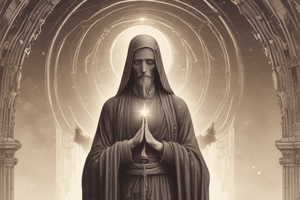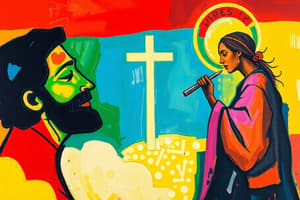Podcast
Questions and Answers
Explain how religion provides a 'system of orientation' for individuals, according to the text.
Explain how religion provides a 'system of orientation' for individuals, according to the text.
Religion offers a framework that dictates what people should live and die for, providing meaning and purpose in life.
In what way does the text suggest humans are 'homo viator' and how does this relate to the development of religion?
In what way does the text suggest humans are 'homo viator' and how does this relate to the development of religion?
Humans are 'homo viator,' journeying beings, constantly seeking something greater than themselves, leading to the establishment of numerous religions over time in the pursuit of this higher power.
According to Erich Fromm, why is religion inevitable in all cultures?
According to Erich Fromm, why is religion inevitable in all cultures?
Erich Fromm argued that religion is an expression of basic human needs, making it an inevitable aspect of all cultures.
How does the text define 'religious experience,' and what is its significance?
How does the text define 'religious experience,' and what is its significance?
Why does the text emphasize the need for careful understanding when exploring religions, religious experience, and spirituality?
Why does the text emphasize the need for careful understanding when exploring religions, religious experience, and spirituality?
Flashcards
Religion
Religion
A vital part of human life that helps answer existential questions.
Erich Fromm
Erich Fromm
Philosopher who argued religion expresses basic human needs, making it inevitable in all cultures.
Religious Experience
Religious Experience
The concept of experiencing God in everyday life.
'Homo Viator'
'Homo Viator'
Signup and view all the flashcards
Spirituality
Spirituality
Signup and view all the flashcards
Study Notes
- Religion is vital, answering existential questions about life and existence.
- Religion has been a vital component of the human condition since the beginning of human civilization.
- Religion provides meaning, sense, and guidance to daily existence by providing a system of orientation.
- Humans seek something greater than themselves, leading to the establishment of religions.
- Philosopher Erich Fromm argued that religion is an expression of basic human needs and is inevitable in all cultures.
- Religions have significantly impacted lives, both positively and negatively, and have held a central role in Western narratives.
- "Religious experience" involves experiencing God in ordinary life, focusing on raw experiences and manifestations.
- Spirituality involves experiencing God daily, even in ordinary things.
- Spirituality is treated similarly, emphasizing the simple way of life for ordinary believers rather than strict monasticism.
- Religion, religious experience, and spirituality need to be understood carefully to move society forward transforming the believer.
- Every religion has an element of transcendence and a search for the deepest values of humanity.
Religion
- The etymology of "religion" has been debated.
- Cicero proposed the Latin word "relegere," meaning "to read or go through again in speech or thought".
- The most commonly accepted etymology is the Latin word "religare," meaning "to bind".
- Early etymologists such as Cicero believed that religion is a system that binds a person to social, moral, and legal duties.
- Definitions of religion provide nominal meaning but do not fully explain the concept.
- Numerous scholars, philosophers, sociologists, and theologians have attempted to explain religion.
- Immanuel Kant saw religion as the recognition of duties as divine commands, inseparable from ethics.
- Emile Durkheim described religion as a set of ceremonial actions assembling a group.
- Karl Marx viewed religion as the "opium of the masses".
Fundamental Features of Religion
- There are seven fundamental features of religion:
- Cosmological Dimension
- Soteriological Dimension
- Anthropological Dimension
- Symbolic Dimension
- Moral Dimension
- Organizational Dimension
- Theological Dimension
Cosmological Dimension
- Religion answers big questions about human existence.
- Religion provides explanations about faith, the universe, creation, nature, meaning, the form of the universe, and humanity's place.
- Religion puts meaning into the world through myths, theories, and visions of the universe and humanity's place in it.
Soteriological Dimension
- Religion provides a scheme for salvation.
- It gives an answer to the question of what happenes after death.
- Religions aim to guide individuals to a positive destination after death (e.g., heaven, samsara, moksha, nirvana).
Anthropological Dimension
- Religions teach people to live together properly beyond the mundane world.
- It encourages seeking beyond human experience and aspire to something beyond comprehension.
Symbolic Dimension
- Religions use symbols and rituals to give meaning to human behavior.
- Religious rituals and practices are prescribed, repeated behaviors for the enrichment of religion and the individual.
- Symbols and rituals create a sound tradition that is transformed through religious tradition (e.g., the cross for Christians, "om" for Hindus, male circumcision for Jews)
Moral Dimension
- Religion provides a moral compass and a sense of a right way to live through morality.
- A moral life lives out the precepts of the religion.
- The concepts of good and evil are effective in providing moral guidance.
- Major religions vary in their definitions of a good life.
- Moral philosophy and religion overlap.
Organizational Dimension
- Religions recognize an authority.
- Religious matters are often settled by religious authorities.
- Most contemporary religions are headed by trained priests or pastors.
- Some religions emphasize internal authority and personal understanding.
Theological Dimension
- Religions introduce the idea that a supreme being Exists.
- God is the primary object of all religious practice and devotion.
- The necessary knowledge and appreciation of the supreme and/or supreme being or beings is main focus.
- Religious devotional systems are considered expressions of the divine
Religious experience
- "Religious" refers to divinity/holiness and a set of beliefs.
- "Experience" refers to something in life or an event, personal and subjective in nature.
- Religious experience means one's personal experience about their encounter with the Sacred within a religious framework.
- Religious experience means the experience of God.
- William James: Religious experience is transcendental and blocks everything away.
- Transcendental means that the experience takes us out of our bodies of normal physical experience.
- The religious experience makes one feel connected to the divine.
- In today's world it is challenging to prove that one encounters the Divine.
- Religious experience is difficult to grasp by human minds.
- According to Rudolf Otto, religious experience is not easily given because it is doesn't reveal itself so obviously.
- Consequences of religious experience are what counts.
Spirituality
- Spirituality differs from spiritism, which believes in spirits apart from matter and ghosts.
- Spirituality is distinct from Spiritualism, involving belief in the survival of personality and communication with the dead.
- Spirituality is unrelated to mesmerism or animal magnetism, which involves dazing subjects and subordinating them to the operator.
- Spirituality is unrelated to hypnotism.
- Spirituality differs from religiosity; religiosity concerns itself with religion, traditions, and beliefs, and is an outward, man-made show of religion.
- Spirituality is concerned with problems of the spirit or soul, and is defined as individuals composed a body and a spirit.
- Sawan Ashram said that“ Spirituality is the science of developing higher consciousness in Man on the level of the soul, and making one transcend from mere bodily consciousness into cosmic consciousness, so as to enable one to understand the working of the divine plan.
- Spirituality can exist independent of religion, allowing people to pursue spiritual growth regardless of religious affiliation.
- Religiosity and spirituality could be practiced in tandem.
- Religisoity and spirituality practiced together would make a better outcome.
- Spirituality can enhance religiosity and religiosity can guide spirituality.
- Spirituality informs and guides religiosity.
Summary and Conclusion
- Religion, religious experience, and spirituality have various definitions.
- It is essential to keep an open to mind to properly understand them.
- The study of religion is complex and technical.
- Further discussions will make these concepts clearer.
Studying That Suits You
Use AI to generate personalized quizzes and flashcards to suit your learning preferences.
Related Documents
Description
Religion provides meaning and guidance, answering existential questions. Humans seek something greater than themselves, leading to the establishment of religions. Spirituality is crucial for experiencing God daily, even in ordinary things.



